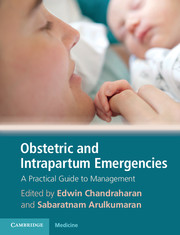Book contents
- Obstetric and Intrapartum Emergencies
- Obstetric and Intrapartum Emergencies
- Copyright page
- Contents
- Preface
- Acknowledgements
- Contributors
- Section 1 GeneralPrinciples
- Section 2 Algorithms for Management of the Top Five ‘Direct Killers’
- Section 3 Intrapartum Emergencies
- Section 4 PostpartumEmergencies
- Section 5 Medical and Surgical Emergencies during Pregnancy
- Section 6 Anaesthetic Emergencies. Section Editor: Anthony Addei
- Section 7 NeonatalEmergencies and Resuscitation
- Section 8 Management ofAnticipated and Non-anticipated Emergencies
- Section 9 Setting up Skillsand Drills Training in Maternity Services
- Index
Section 4 - PostpartumEmergencies
Published online by Cambridge University Press: 05 November 2012
- Obstetric and Intrapartum Emergencies
- Obstetric and Intrapartum Emergencies
- Copyright page
- Contents
- Preface
- Acknowledgements
- Contributors
- Section 1 GeneralPrinciples
- Section 2 Algorithms for Management of the Top Five ‘Direct Killers’
- Section 3 Intrapartum Emergencies
- Section 4 PostpartumEmergencies
- Section 5 Medical and Surgical Emergencies during Pregnancy
- Section 6 Anaesthetic Emergencies. Section Editor: Anthony Addei
- Section 7 NeonatalEmergencies and Resuscitation
- Section 8 Management ofAnticipated and Non-anticipated Emergencies
- Section 9 Setting up Skillsand Drills Training in Maternity Services
- Index
Summary
- Type
- Chapter
- Information
- Obstetric and Intrapartum EmergenciesA Practical Guide to Management, pp. 120 - 144Publisher: Cambridge University PressPrint publication year: 2012



